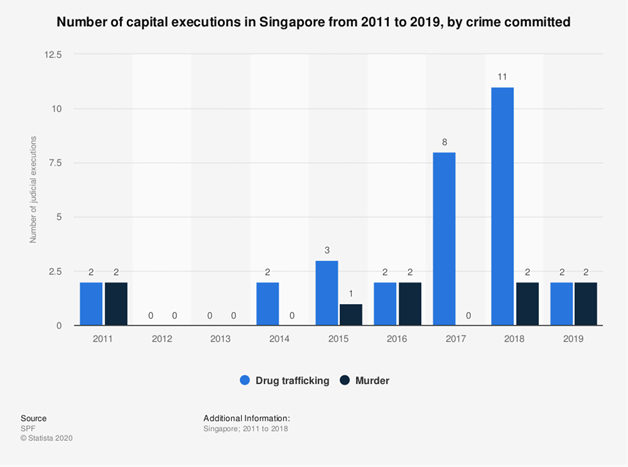Singapore’s Court of Appeal has rejected a bid by 31-year-old British citizen Yuen Ye Ming to reduce his sentence for drug offences committed in 2016 and 2018. Ming was sentenced to 20 years imprisonment and 24 strokes of the cane on two sets of charges of trafficking, possession and consumption, the second of which was committed when he was out on bail in 2018.
At the time of his arrest in 2016, Ming was originally facing the death penalty, but the capital charge was dropped as the net weight of cannabis he was carrying came in below the death penalty limit of 500 grams (17.64 ounces) under the Misuse of Drugs Act.
This was the second appeal by the London-born, Singapore-based drum and bass DJ to raise legal questions of public interest to Singapore’s highest court. Represented by human rights lawyer M Ravi, the appeal consisted of three issues, including whether two separate caning sentences can be ordered to be imposed concurrently, instead of cumulatively.
“Singapore prides itself on the notion that it’s a nation that is so strict, with zero-tolerance for drugs, and therefore it has functioned well. Singapore is in the league of Iraq, Saudi Arabia, North Korea and China, as leading proponents of the death penalty. That is quite bizarre for the world to watch – it’s as though Singapore has sought a leadership position that they don’t want to lose,” M Ravi told VICE News.
Singapore has long been recognised for its hardline stance on drug offences, and the country’s criminal justice system has come under question for its disregard of international human rights. Between 1994 and 1998, Singapore had the second highest per-capita execution rate in the world. In 2018, capital executions hit a decade-long high at 13 hangings, 11 of which were for drug trafficking.
While Ming managed to evade death, the prospect of the maximum number of 24 strokes of the cane is particularly daunting.
Ming will be stripped naked and strapped to a wooden “flogging frame” by his wrists and ankles. Bent over with his buttocks exposed, he will then be whipped by a half-inch thick pliable rattan cane, likely causing his skin to split open and bleed. With no advanced warnings given for when the canings might be carried out, and multiple strokes often arbitrarily spaced out across the duration of a prison sentence, the punishment is designed to maximise physical and mental damage.
Ming’s petition to the President of Singapore for clemency on his caning sentence was rejected in January this year.
Prisoners often sustain life-long physical scars from the practice. Some even get long-term kidney issues, despite a protective padding around their lower back to guard against hits that go off-target. More humiliatingly, some urinate on themselves and pass out from the pain. This is coupled with undeniable psychological trauma, sometimes leading to mental illness.
For the island city-state, caning remains a mandatory punishment for certain offences such as rape, drug trafficking and overstaying a visa as a foreigner. Only male offenders between the ages of 18 and 50 with no pre-existing spinal health issues are liable to be caned. This form of punishment came under global scrutiny in the 90s, when U.S. student Michael Fay was sentenced to four strokes of the cane for vandalism.
Today, Singapore is one of just 29 countries in the world that applies such measures of judicial corporal punishment – a drastic contrast to the modern and sophisticated image it often promotes itself as to the rest of the world. Such archiac practices are retained only by a handful of former British colonies, as well as Muslim-majority countries under Sharia law. In Singapore’s particular instance, caning was introduced by the British government in 1872 as a means to control “riff-raff” Chinese rioters.
Denying that it is cruel and inhumane, Singapore upholds caning as an effective form of deterrence against crime, even despite a lack of empirical evidence to support such a claim. Public perception remains highly in favour of such tough punishment for drug offenders, with 80.1% and 69.6% agreeing that caning and the death penalty respectively are appropriate punishments, according to a 2018 survey by the Ministry of Home Affairs.
In 2015, Singapore’s Court of Appeal rejected a challenge that caning is discriminatory and a form of torture. This was also led by M Ravi on behalf of Malaysian drug trafficker Yong Vui Kong, whose original death sentence was reduced to life imprisonment with 15 strokes of the cane. The United Nations Convention against Torture, of which Singapore is not a signatory, defines torture as “any act by which severe pain or suffering, whether physical or mental, is intentionally inflicted on a person”.
“The state has a right to discipline, but the state does not have the right to cause physical injury,” affirms M Ravi. “Caning is racist in origin, it is discriminatory, and it has no rational nexus to the objective of the legislation which is to control and discipline.”
from VICE US https://ift.tt/3kEXttJ
via cheap web hosting

No comments:
Post a Comment